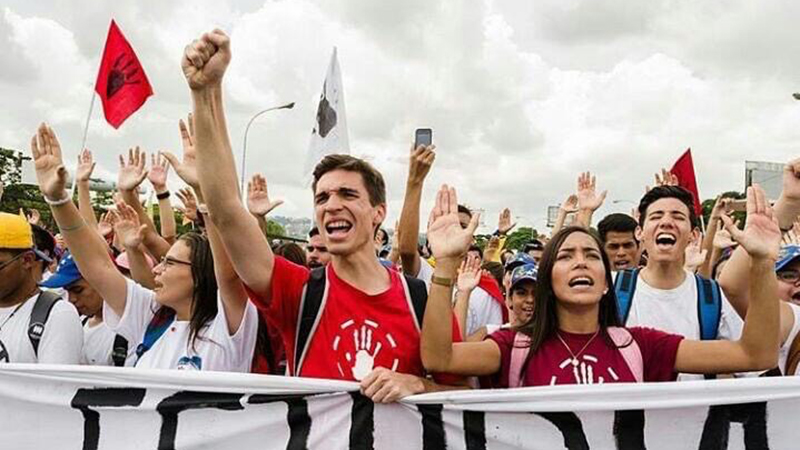
Born and raised in Venezuela, Jorge Galicia remembers a happy childhood with great birthday parties, international vacations, and a close-knit family. He never imagined that one day he would be forced to go into hiding and eventually flee his country simply to stay alive. Now working as a TFAS outreach fellow, Galicia uses his story to share the dangers of socialism with college students across the Americas.
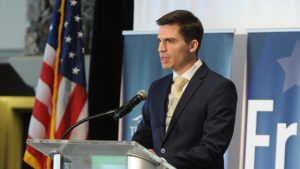
When he was a teenager, Galicia began to notice slight changes in his middle-class family’s way of life. The 20 bolivares (Venezuelan currency) his mom gave him for school lunch no longer bought a full meal. His family waited in a line wrapped around the block just for a piece of bread. Electricity and internet connections began to fail. The water supply to their home dwindled. They no longer felt safe walking down the street after being robbed at gunpoint several times.
The turning point of Venezuela’s collapse came around 2013-14. The harsh economic and political realities resulting from tyrannical government control completely eviscerated Galicia’s way of life. His family became poor. They didn’t have enough to eat. They couldn’t even shower regularly because of the rationed water supply – they had to use a bucket. They were suddenly living a life they couldn’t possibly have fathomed.
Even with the dramatic changes, life went on. Galicia went to college, where he joined a political party and student movement. He began to learn more about Cuba and other countries that had undergone socialist revolutions. He also learned about various political doctrines and studied the importance of individual liberty. He became increasingly passionate about these ideas and got more involved in the fight for freedom.
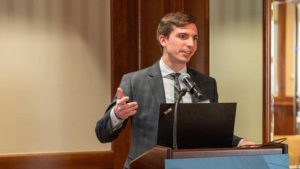
“I was a happy kid,” Galicia said, reflecting on the transition from childhood to adulthood. “I never imagined that I was ever going to be involved in activism for freedom the way I am now. I especially never imagined the reasons why I would need to become an activist.”
Advocating so strongly for these principles at a time when political persecution was at an all-time high involved major risks. Galicia’s mom tried to stop him from protesting, but he knew he was fighting for a good cause: freedom for the people of Venezuela. At the same time, he attended law school classes during the week. Between studying and protesting, Galicia’s fight for freedom never stopped.
Forced to Disappear
Things came to a head in 2017 when Galicia’s best friend was captured by President Maduro’s corrupt police force known as colectivos. They took him in the middle of the night and sent him to prison, where they tortured him for speaking out against the president. Galicia, who was involved in the same protests and activism as his friend, was forced to disappear to avoid capture. He couldn’t communicate with anyone in his family while he was in hiding – not even his mother knew where he was.
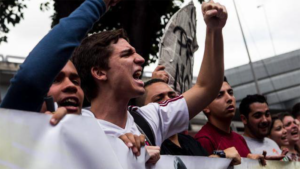
“One day I was a student, I was going to classes and worrying about my exams,” he said. “All of a sudden, that totally changed. I was facing persecution and I needed to disappear as if I were a criminal, but of course, I was not.”
His friend was finally released after three months. At that point Galicia was able to slowly reintegrate to normal life. But nothing was the same. His life had completely changed. Wracked with guilt for being in a better position than his friend, who was like a brother to him, and being completely cut off from the outside world decimated his hopes for the future. He couldn’t return to political activism after that, but he did finish his law degree. He left for the United States just a few weeks after finishing his exams, not even staying to attend his graduation ceremony.
Galicia was selected to participate in Project Arizona, an educational program developed by TFAS alumnus Jacek Spendel ’08, ’09. Through this program, Galicia sought refuge in the United States while building professional skills and learning how to be an even more effective advocate for liberty. He recalled previous trips to the U.S., saying that he always wanted to return home after a week or two because he missed home. This time, it felt like there was nothing left for him in Venezuela.
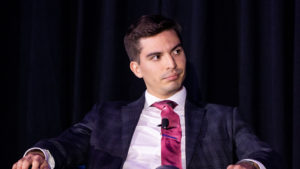
Arriving in the U.S. was like a dream. Galicia recalls the freedom to walk down the street without fear. He didn’t have to worry about his phone being stolen from his hand or saying the wrong thing and being hunted down. He finally had the freedom to live as he chose. Even something as simple as knowing his money wouldn’t disappear or be worthless the next day was wonderful. He specifically remembers the first time he took a hot shower in the hotel – to have hot water come from the faucet was almost magical. Many Americans don’t think twice about these things, but they could evaporate within months if socialism were to become the law of the land.
“The consequences will be devastating if socialism manages to take hold here,” Galicia said. “I don’t want to go through that all over again. A lot of things that people take for granted could easily be gone if we follow the wrong ideas.”
“That Will Never Happen Here”
Of course, no one ever thinks this will happen to them, not in their own country, but Galicia remembers multitudes of Cubans in 1999 warning Venezuelans of the dangers of socialism before Chavez was reelected.
“A lot of people said this could never happen in Venezuela, but it happened,” he said. “Now we regret it. I hear Americans say this will never happen in the United States, but if we follow the wrong ideas, it will. We’re already seeing consequences here that we saw when socialism began to take hold in Venezuela.”
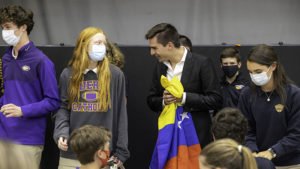
Galicia’s outreach work with TFAS sends him throughout the U.S. to share his personal story with college students. He has delivered his presentation at a multitude of universities, including the University of Chicago, Illinois; Montana State University; University of North Texas; University of the Ozarks; and University of Alabama. He never imagined he’d be able to do this and is grateful to TFAS for giving him the opportunity. Sharing his story is his way of saying thank you to the U.S. for granting him safety.
The majority of the students are respectful and often engage with him, sometimes debating different ideas and political topics. It is always civil and respectful, and Galicia can tell that the students come to listen. They are generally open to what he has to say, even if they disagree with it.
Galicia recalls one student who sat in the back of the room with her arms crossed and a frown on her face. He prepared for an intense debate, but she didn’t speak up during the Q&A. She approached him as he was about to leave and shared that a friend forced her to come. She hadn’t wanted to, but after hearing his story, she was glad she came and respected Galicia and his courage to share his message.
Galicia and fellow outreach partner Andrés Guilarte both advocate for big ideas. They speak out for freedom and share their personal stories. Now that he’s in the U.S., Galicia advocates because he wants to retain his freedoms.
“I love America,” he says. “I love the opportunities I have found here, and I don’t want to lose any of that. That’s why I’m doing everything I do. I don’t want to see freedom thrown out. I want to keep being a free man.”
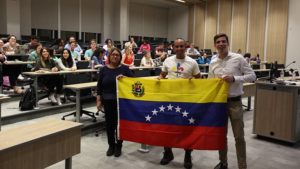
Someday when it’s safe, Galicia hopes to return to Venezuela. He still wants to be an attorney and plans to continue his education to one day practice law in the U.S.
“It is still not safe for me to return to Venezuela, which I’d love to do eventually. I don’t know if I’ll ever be able to, but it’s still my country. I love Venezuela and I want to serve my nation, but there’s no way now for me to do it safely.”
Despite the pain and suffering Galicia has endured, he retains immense strength, spirit and resilience. He has hope for Venezuela’s future and hope for his own future, too. More than that, he has hope that his work here in the U.S. will help safeguard and protect the rights and freedoms of the American people.
To learn more about Galicia’s work through the Venezuela Project, visit TFAS.org/Venezuela.

